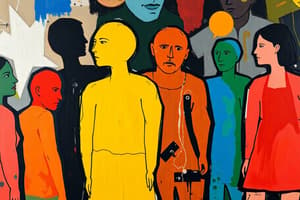Podcast
Questions and Answers
What is deviance?
What is deviance?
Deviance is a behavior that violates the standards of conduct or social norms of a group or society.
Which of the following is NOT a type of deviance?
Which of the following is NOT a type of deviance?
- Bad Behavior
- Odd Behavior
- Admired Behavior
- Conventional Behavior (correct)
What are norms?
What are norms?
Norms are rules or guidelines regarding acceptable and appropriate behavior within a culture.
What are folkways?
What are folkways?
Which of the following is an example of mores?
Which of the following is an example of mores?
A ___ is a norm that evokes strong feelings of disgust or horror.
A ___ is a norm that evokes strong feelings of disgust or horror.
What are sanctions?
What are sanctions?
Who proposed the Strain Theory?
Who proposed the Strain Theory?
What is a function of deviance according to the Structural-Functionalist Perspective?
What is a function of deviance according to the Structural-Functionalist Perspective?
Flashcards are hidden until you start studying
Study Notes
Understanding Deviance
- Deviance refers to behaviors that breach social norms or expectations of a group or society.
- What is considered deviant can vary widely between cultures.
- Sociologists classify deviance through social judgment rather than moral evaluation.
Types of Deviance
- Odd Behavior: Unconventional actions that may raise eyebrows but generally do not harm others.
- Admired Behavior: Actions that deviate from norms but are viewed positively by society.
- Bad Behavior: Actions that violate societal rules and are deemed harmful or unacceptable.
Norms and Sanctions
- Norms are rules that dictate acceptable behavior in a culture, consisting of formal and informal categories.
- Formal norms: Written laws (e.g., legal codes) or explicit organizational rules.
- Informal norms: Unwritten and unspoken cultural expectations.
Types of Norms
- Folkways: Mild norms with little serious repercussions when violated; often related to everyday etiquette (e.g., dressing appropriately, saying please and thank you).
- Mores: Strongly held societal rules that carry moral implications, with severe consequences for violation (e.g., theft, dishonesty, extramarital affairs).
- Taboo: Profoundly ingrained norms that provoke strong feelings of disgust when violated, varying significantly across cultures (e.g., addressing elders improperly, refusing a meal).
Sanctions
- Positive or negative reactions to adherence or violation of norms.
- Formal Sanctions: Imposed by authorities (e.g., grades from teachers).
- Informal Sanctions: Imposed by community members (e.g., social invitations or ostracism).
Theoretical Foundations of Social Deviance
-
Structural-Functionalist Perspective (Emile Durkheim):
- Deviance is defined in relation to societal norms and contributes to social order.
- Functions of Deviance:
- Affirms cultural norms and values.
- Clarifies right from wrong.
- Unifies society against deviance.
- Promotes social change.
-
Strain Theory (Robert King Merton):
- Deviance arises from the strain and frustration individuals experience when unable to achieve universally accepted goals through legitimate means.
- Anomie: A state where social norms are confused or absent, leading to deviant behavior.
Studying That Suits You
Use AI to generate personalized quizzes and flashcards to suit your learning preferences.




